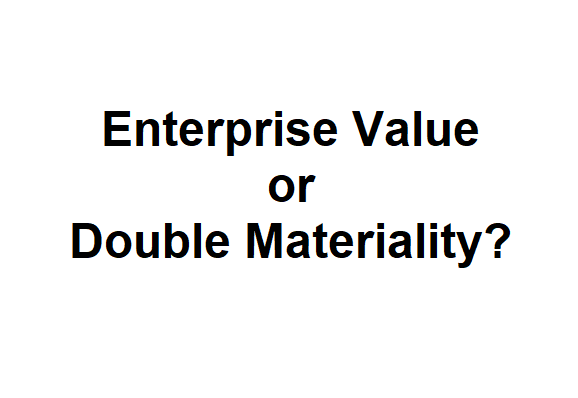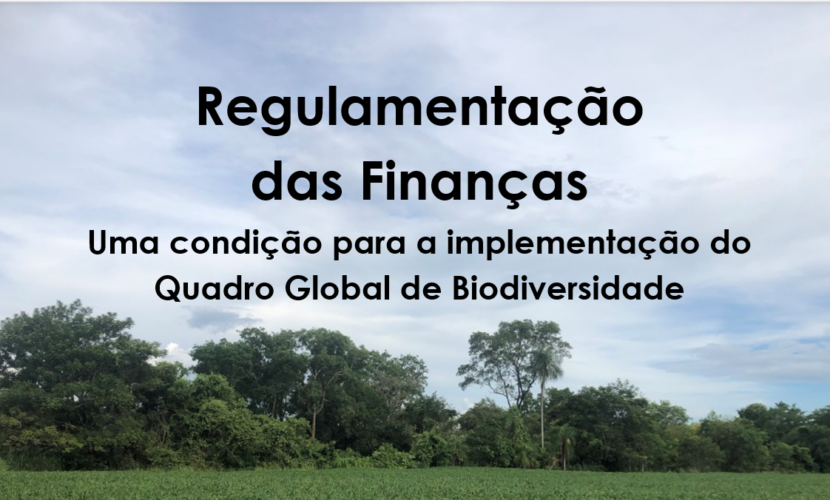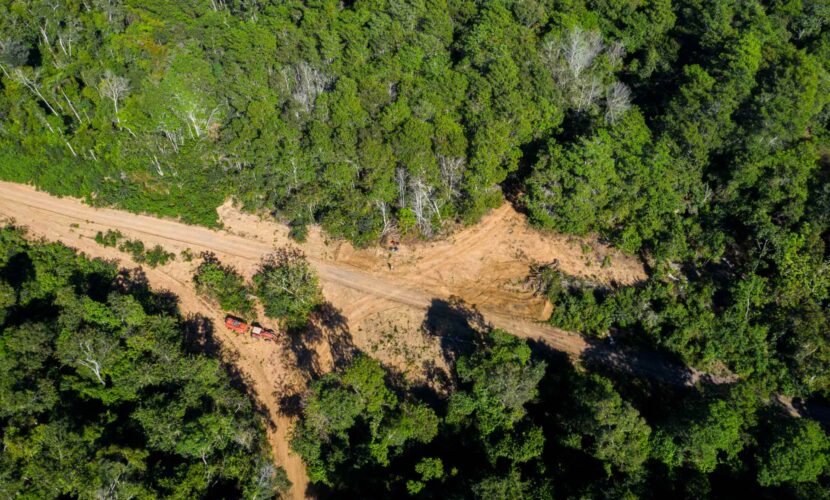Notícias
New evidence reiterates that TNFD doesn’t have a mandate for its ‘enterprise value’ only approach

In March 2022, the Taskforce on Nature-related Financial Disclosures (TNFD) released its first of four drafts intended to develop a framework for business reporting on nature-related risks. The TNFD taskforce is made up of 34 senior staff from global corporations. While it is a voluntary initiative to develop a framework for how business should report on nature, it is hoping to influence future business regulations.
To date, its drafts only require a business to report on significant financial risks and opportunities in the short, medium or long-term – in this case those that may arise from its reliance or impacts on nature (referred to as an ‘enterprise value’ approach). Raising concern that instead of requiring businesses to end their role in destroying nature – and the human rights abuses that often underpin it – it condones ongoing harms so long as they do not hurt profitability. An alternate approach would be to marry this focus on financial outcomes with requirements for business to report on actual or potential risks and impacts on nature, and the people who depend on or defend it. A concept often referred to as ‘double materiality’.
TNFD’s basis for adopting the ‘enterprise value’ approach doesn’t appear to be evidence based. TNFD has stated that it should align with the newly instituted International Sustainability Standards Board (ISSB) as part of efforts to consolidate sustainability standards. ISSB faces many similar legitimacy issues as TNFD, including failing to adopt the diverse multi-stakeholder decision-making that the world’s leading biodiversity scientists have urged. What TNFD failed to spell out was that the ISSB language itself was only in draft form and that feedback on its exposure drafts were not due until July 2022 – after TNFD released its second draft in June. A final decision on ISSB’s approach isn’t expected until the end of 2022, likely after TNFD has released the third of its four planned drafts. TNFD itself has never consulted on if TNFD public disclosures should be based on enterprise value or double materiality and doesn’t appear to plan to.
What the public feedback to ISSB now shows is that even within the narrow subset of groups following this process there is no clear mandate on the ‘enterprise value’ path. While there is certainly support for the approach ISSB proposed, this is far from universal. The International Capital Market Association, the European Central Bank, the Asia Securities Industry & Financial Markets Association, the Dutch Financial Markets Authority and the American Academy of Actuaries all raised concerns with ISSB’s proposed enterprise value approach and advocated for double materiality, as did several NGOs.
Accounting firm Deloitte supported reporting on impacts on people and the environment noting that “poor conduct by a company may not affect financial returns in the short, medium or even long term despite it being unacceptable in the realm of sustainable development. In fact, historical evidence of this is plentiful.” The Global Head of Sustainability Fitch – an arm of one of the world’s largest credit ratings agencies – also spoke out on the need for double materiality.
A former member of the technical working group of the Climate Disclosure Standards Board, later incorporated into ISSB, publicly criticized ISSB’s approach noting that “it’s creating an extremely dangerous precedent that the social and environmental issues only matter insofar as they affect profitability, and that will have reverberating effects.”’
The American Academy of Actuaries drew on current research to outline flaws in the enterprise value approach and called for impact reporting. It pointed to evidence from a similar framework, noting that “relatively few companies are likely to provide robust responses” under the Taskforce on Climate-related Financial Disclosures (TCFD). TCFD was finalized in 2017. The OECD also noted “while the [Financial Stability Board’s TCFD] has been instrumental in achieving a transition in thinking amongst investors, its focus on financial materiality of climate change may be insufficient to foster reallocation of capital to align with the low-carbon transition.” A point underscored by four oil and gas companies posting a record $51 billion profit in the second quarter of 2022.
Securities exchanges from Thailand and India noted to ISSB that quantifying how adverse social or environmental impacts – which may not be financially detrimental today – will affect a businesses’ financial value is challenging for enterprises or may lead to misleading disclosures. Tata Steel also highlighted that this creates data comparability issues – two separate companies presented with exactly the same impacts may draw vastly different conclusions in speculating what may financially affect their business in future. Last year, the 2021 TCFD status report itself found that only 20% of consultation respondents report on how their climate-related risks or opportunities affect their current financial performance. This drops to 14% for reporting on potential future financial outcomes. Again provoking the question as to why TNFD would make financial performance the main pillar of its approach – rather than marrying it with real-world risks and impacts. This is a delay and distraction the world cannot afford if it is to make any headway on halting and reversing biodiversity loss by 2030.
BNP Paribas wrote: “A company’s impacts to nature, for example, will not always create foreseeable risk to that company, but may exacerbate the systemic risk of nature loss, which affects all companies. The complexity and severity of this systemic risk is entirely lost by placing enterprise value – as opposed to biosphere integrity – at the center of concern.” Others also raise this point. A central bank study group on nature-related risks refers to this as the ‘endogeneity of risk’. A joint submission by investor organizations as well as various NGOs and academic institutes called for double materiality. They also urged ISSB to “adopt processes for standard-setting that ensure that those with first-hand knowledge of these risks can inform determinations of materiality” and “formaliz[e] engagement with civil society organizations.”
Unlike ISSB, TNFD does not make survey responses, submissions or information about meetings public – making it virtually impossible to scrutinize how decisions are made. As TNFD’s taskforce is only made up of staff from global corporations it is particularly susceptible to criticism that its decisions are led by self-interest rather than evidence-based. If you ask a room of global corporations if they would like to publicly report on any environmental and human rights abuses they’re linked to, the answer is hardly likely to be a resounding ‘yes’. Even more so, given TNFD’s aspirations for its template to be adopted as future regulation. We do know that some corporations have publicly called for TNFD to adopt double materiality, as has a May 2022 letter by 28 NGOs and networks whose members include over 220 organizations across six continents. ISSB submissions now show that even several TNFD taskforce members have called for double materiality – namely Mirova, Deloitte BNP Paribas and Moody’s. Tata Steel pointed out that the ISSB’s enterprise value only approach “would likely not fully address the needs of the remaining key stakeholders (governments and regulators/ communities/civil societies)”. TNFD co-founder WWF, as well as the OECD and CDP also called for double materiality.
Alarmingly, in its own submission to ISSB in July, the TNFD Secretariat failed to acknowledge that concerns about double materiality had even been raised.
While TNFD claims to be ‘science-based’ and expounds on datasets on how to measure biodiversity, it does not appear to be ‘evidence led’ in that it appears to have devoted little time or rigor to identifying what types of reporting effect change in business practices and which don’t. The argument put forward is that TNFD should align itself to other standards to improve business uptake. However, widespread uptake of an ineffective framework will do little to deliver for biodiversity. Additionally, the vast majority of the world’s largest businesses have already adopted impact reporting through the Global Reporting Initiative standards – again, raising the question why TNFD is so resistant to marrying reporting on nature risks to business, to business risks to nature. As NGO TuK Indonesia point out on TNFD “If environmental destruction isn’t even reported, and the rights of local people aren’t respected, business as usual will persist.” Should TNFD commit to double materiality, the next question that arises is what types of double materiality reporting are most effective in effective change in business practices.
Many are likely to interpret TNFD’s stance as an example of corporate capture – i.e. that the global corporations that benefit most from the status quo are the least likely to press hard to change it. Another factor that plays into the hands of those who are unwilling to step away from their harmful practices is that TNFD is being led by a rushed arbitrary timeline of 18 months to prepare its framework. That the need to get TNFD done is being used as an excuse to shut down the space to do it well. If TNFD was serious about evidence-based decision-making, it could simply choose to extend its timeline by 12-18 months – pointing out to its funders, including UN agencies, the obvious risks to its long-term credibility if its processes and outcomes aren’t trusted. This would also allow TNFD to confront critical due process issues – such as the need to bring diverse perspectives to the table beyond global corporations.







